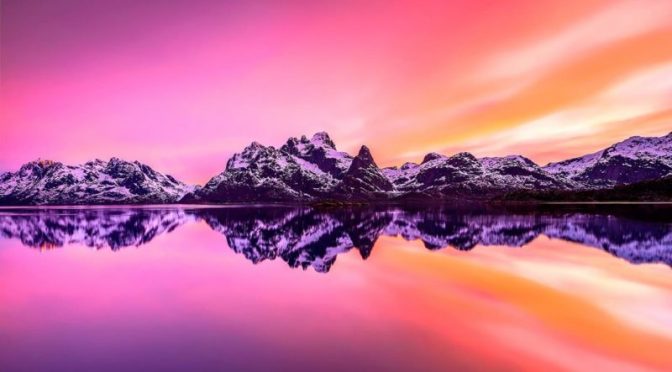The sheer variety of landscapes (sheer being the perfect word for it), in the Scandinavian country of Norway make it one of the most captivating locations for landscape photography in the world. From north to south the scenery changes dramatically, allowing you to capture such natural wonders as frozen beaches, turquoise seas, breath-taking fjords or arctic wildlife, with the chance to camp under the mesmerising green of the Northern Lights.
Whether you’re climbing high, free camping (it’s totally allowed) or focused on shooting cityscapes during your tour, follow this practical must-see list for the best places to photograph in Norway…
1. LOFOTEN ISLANDS – FOR A “TROPICAL” PARADISE
Way up north, with its latitude in the Arctic Circle, sits the Lofoten archipelago. Here you will find the world’s largest deep water coral reef (Røst Reef) and the world’s most northerly surf school. Visiting photographers who aren’t part of a photo tour need a car to explore. Without being exposed to the temperatures of North Norway, you might think pictures of the Lofoten Islands look almost tropical… think white beaches, turquoise water and pretty, little fishing villages. Those beaches are actually one of its best landscape photography locations. Kvalvika Beach is easiest to visit, with one of the best views in the Lofoten. It’s a simple one hour hike over a mountain pass, completely isolated from light or noise pollution, allowing you to focus on the rural, rugged landscape rising up around the icy paradise below. For a postcard shot, visit the town of Reine for beautiful reflections of its red houses along the waterline. Close by is the small fishing village of Hamnøy: park your car at its nearby bridge and take a long exposure shot. Wildlife-wise, expect to see plenty of sea eagles, cormorants, colourful puffin, otters and moose.

2. NORTHERN LIGHTS – FOR A PHOTOGRAPHIC PILGRIMAGE
Also known as the Aurora Borealis, this unique visual performance of scattered, colourful light across the northern sky is one of the most spectacular shots a landscape photographer could wish to capture. Hot spots for experiencing the Aurora include the North Cape, the city of Tromsø and locations throughout the Lofoten between latitudes 68 and 74 degrees. Try parking up at Skagsanden Beach in the Lofoten, or fly into Tromsø and explore its surrounding area. Patience is key. You want clear skies, so check the local weather forecast for less than 20% cloud cover. You also want a camera with a shutter release mechanism and a sturdy tripod. The best time of year to see the Northern Lights live is during winter, so pack your thermals!
3. TROLLTUNGA – THE TROLL’S TONGUE
This photography location is not for the faint-hearted, but its cliff-side views are truly amazing. Perhaps one of the most popular photo spots in natural Norway, Trolltunga is a ten-thousand-year old piece of jagged rock suspended almost 700 metres above Lake Ringedalsvatnet. If you’re fine with heights, the next obstacle is overcoming the 10-12 hour long hike (23km) from its base to its peak, and back. Starting in Skjeggedal, you traverse mountains and ascend a total of 1,100 metres. Your reward is multiple views of glaciers, wildlife, waterfalls and panoramic shots of this ancient land. For the best light, especially at sunrise and sunset, camp on the mountain in good weather.
4. ÅLESUND – FOR ART NOUVEAU ARCHITECTURE
Sometimes affectionately referred to as the Toy City, the town of Ålesund is a charming little sea port featuring seven islands, with streets that look more like a colourful collection of model houses. Its Art Nouveau architecture may be extremely photogenic, but this unique style of housing rose from a tragic past. In 1904, almost all of Ålesund was burnt to the ground in a terrible fire, resulting in the rebuilding of the majority of its cityscape. Photographers can’t miss taking the path from Town Park in the city centre, climbing up 400 steps (or taking the train up to Fjellstua), to reach the Aksla Utsiktspunkt (viewpoint) for a brilliant panorama of the archipelago and Sunnmøre Alps.

5. LYSEFJORDEN – BOUND FOR PULPIT ROCK
A fjord is a long, narrow sea corridor framed by towering cliffs, originally formed by a submerging glacier. Norway has some of the finest fjords in the world, such as Lysefjorden and its landmark Pulpit Rock (Preikestolen in Norwegian). Located in Forsand, Rogaland county, Lysefjorden is an incredible 42km long body of water (26 miles) surrounded by rocky walls reaching 1000m in height. Only one bridge crosses it and there are small villages at the eastern and western ends of the fjord. Drive or take a bus to the Preikestolen car park and commence the two-hour hike uphill – pack light camera equipment for this one. In mild weather, you may even want to take your swimmers, as there’s a lake near the top! Once at the peak, you’ll need to summon all your courage to get close to the edge of Pulpit Rock for that winning shot.













